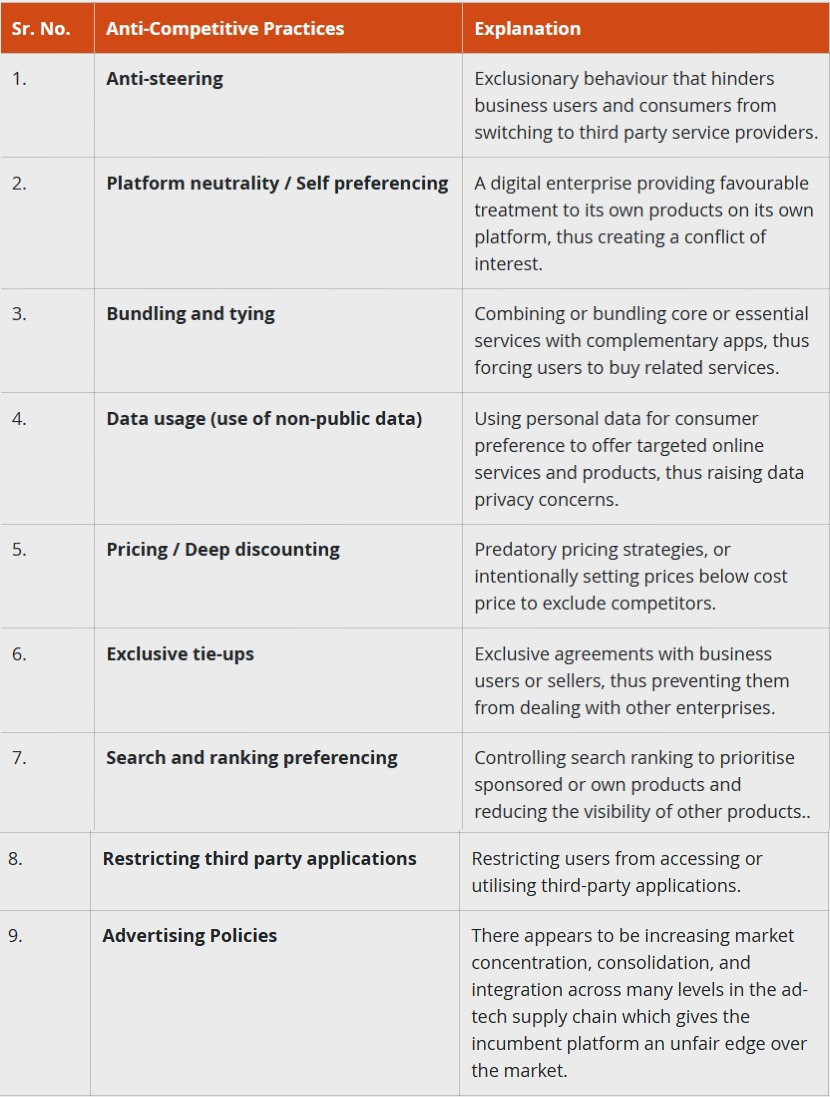Description

Copyright infringement not intended
Picture Courtesy: https://finshots.in/archive/whats-the-digital-competition-bill-anyway/
Context: India has proposed a new digital competition law, the Digital Competition Bill, 2024, to curb market dominance by tech giants like Google, Facebook, and Amazon.
Details
- The draft Digital Competition Bill proposed by the Ministry of Corporate Affairs (MCA) aims to address market dominance by large tech companies and prevent anti-competitive practices in the digital sector.

Key Provisions
Predictive Regulation
- The concept of predictive regulation involves implementing rules and regulations proactively to prevent anti-competitive practices before they occur. This contrasts with traditional reactive regulation, which addresses issues after they have already caused harm.
- Predictive regulation aims to anticipate potential harms in the rapidly evolving digital market and establish preemptive measures to mitigate them. By doing so, it seeks to create a more competitive and fair environment for businesses and consumers alike.
- The rationale behind predictive regulation is to avoid the delays and inefficiencies associated with addressing market abuses ex post facto. By establishing clear rules and guidelines upfront, regulators can deter anti-competitive behaviour and promote competition and innovation in the digital sector.
Significant Entities
- The Digital Competition Bill proposes identifying certain companies as "Systematically Significant Digital Enterprises (SSDE)" based on specific criteria such as turnover, user base, and market influence.
- These designated SSDEs would be subject to stringent regulations aimed at preventing anti-competitive practices such as self-preferencing and anti-steering. Penalties for violations could amount to significant fines, up to 10% of global turnover.
- The goal of designating SSDEs is to address the market dominance of large tech companies and level the playing field for smaller competitors. By subjecting these entities to stricter regulations, regulators aim to promote competition and innovation in the digital market.
Associate Digital Enterprises
- The bill addresses the role of associate digital enterprises (ADEs), which are entities within a corporate group that benefit from data collected by the main company.
- ADEs would be subject to similar regulations as SSDEs, depending on their involvement with the core digital service offered by the main company. This includes restrictions on practices such as self-preferencing and data sharing.
- The inclusion of ADEs reflects regulators' recognition of the interconnected nature of digital ecosystems and the potential for anti-competitive behaviour to extend beyond individual companies.

Reasons for Big Tech Opposition
Compliance Burden
- Big tech companies argue that the proposed regulations impose a significant compliance burden, diverting resources away from innovation and research. Compliance with strict regulatory requirements could hinder their ability to develop new technologies and services.
- These companies fear that a focus on regulatory compliance could stifle entrepreneurship and deter investment in the digital sector, ultimately harming innovation and economic growth.
Impact on Innovation
- Tech giants contend that overly restrictive regulations could inhibit their ability to innovate and introduce new products and services to the market. Strict regulations may discourage risk-taking and experimentation, leading to a stagnation of technological progress.
- Innovation is essential for driving economic growth and addressing societal challenges. Big tech companies argue that regulations should strike a balance between promoting competition and fostering innovation to ensure continued technological advancement.
Restrictions on Business Practices
- The proposed regulations restrict certain business practices such as self-preferencing and data sharing, which are integral to the business models of many tech companies. For example, Apple's control over its App Store ecosystem could be challenged by requirements to allow users to download apps from third-party stores.
- Big tech companies argue that these restrictions could disrupt their existing business models and undermine their competitive advantage in the market. They contend that such regulations should be carefully crafted to avoid unintended consequences and maintain a healthy balance between competition and innovation.
Broad Definition of Significant Platforms
- There are concerns among big tech companies about the broad definition of significant platforms and the discretion given to regulators to designate SSDEs. This raises fears of arbitrary decision-making and potential negative consequences for smaller businesses and startups.
- Companies worry that the regulations could disproportionately impact smaller players in the market and hinder their ability to compete with larger incumbents. They advocate for clearer guidelines and criteria for designating SSDEs to ensure fairness and transparency in the regulatory process.
|
Government officials argue that big tech companies have anti-competitive practices and a presumptive framework is needed to address this. High market barriers and niche online products are relegated to users seeking specific features. The growth of big companies has led to a surveillance-filled digital advertising industry, making it difficult for rivals to challenge their dominance.
|
Conclusion
- The need to foster digital competition is essential for promoting innovation, protecting consumer choice, and ensuring a fair and vibrant digital market ecosystem. Regulatory measures, such as a presumptive framework and stricter enforcement against anti-competitive practices, are crucial for achieving these objectives and levelling the playing field for all participants in the digital economy.
Source:
Indian Express
PIB
|
PRACTICE QUESTION
Q. What are the major challenges faced by the Indian government in bridging the digital divide between urban and rural areas, and how can these challenges be effectively addressed to ensure equitable access to digital services and infrastructure across the country?
|















